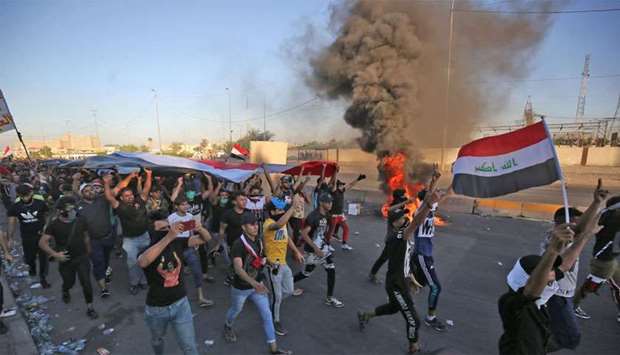Days of anti-government protests continued in Iraq on Saturday, with nearly 100 people thought to have died in clashes between demonstrators and security forces.
The latest deaths included two people who were killed when security forces opened fire to disperse renewed protests in Iraq's capital Baghdad.
Security forces opened fire at around 200 protesters who gathered at the road linking the Falastin Street with Tayeran Square in eastern Baghdad on Saturday, witnesses told dpa.
Since Tuesday, thousands have taken to the streets of Baghdad and several provinces to protest against corruption, lack of job opportunities and poor services - in particular access to electricity and clean water.
The protests, largely led by young people, renewed at the weekend after a two-day-old curfew in Baghdad was lifted early Saturday.
The protesters set fire to tyres and security forces were chasing them in the area, according to witnesses.
Earlier on Saturday, the High Commission for Human Rights put the death toll from days of anti-government protests across Iraq at 93 people, the majority of whom are demonstrators.
Ali al-Bayati, a member of the commission, said that 4,000 other people have been wounded in clashes between security forces and protesters.
At least six policemen are among those killed, he added.
Parliament speaker Mohammed al-Halbousi and his two deputies met with a group of protesters on Saturday to listen to their demands.
The parliament failed to hold a session on Saturday to look into the demands by the protesters.
Prime Minister Adel Abdel-Mahdi chaired a meeting on Saturday with the ministers of defence and the interior to discuss the latest developments in the protests.
Protests were met with tear gas and gunshots from security forces, followed by a curfew in the capital and elsewhere.
In a speech on Friday, Abdel-Mahdi vowed to respond to the public's ‘rightful demands,’ but said that people must return to their normal lives. The state had no ‘magic solutions,’ he said.
The country's top Shia cleric Ayatollah Ali al-Sistani has criticized the government and parliament for failing to carry out reforms and meet demands of Iraqis.
He condemned the violence and attacks on both protesters and security forces.
Moqtada al-Sadr, the Shia cleric whose coalition won the largest number of seats in last year's parliamentary elections in Iraq, has called on the government to resign.
UN Secretary General Antonio Guterres has called for dialogue between the Iraqi government and the demonstrators as an immediate step towards de-escalation.
The protests come one year after Abdel-Mahdi took office in Iraq, which is still grappling with a lengthy military campaign against the Islamic State extremist group.

